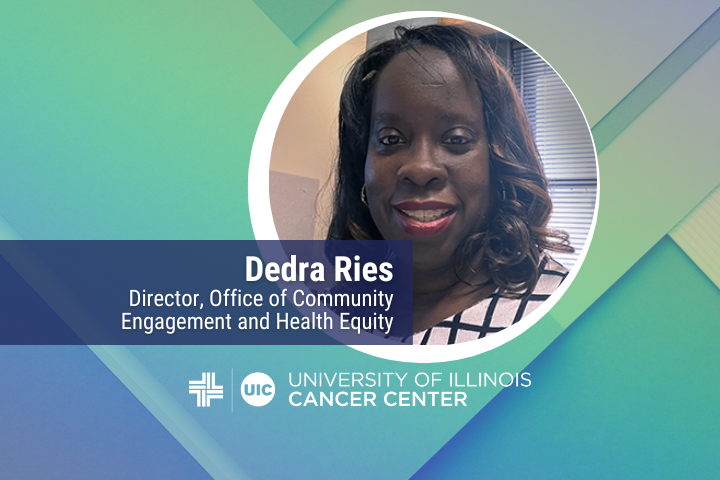
Cancer took Dedra Ries’ grandmother from her, and she is working so that the deadly disease won’t do the same to others.
As the University of Illinois Cancer Center’s new director of Community Engagement and Health Equity, Ries was drawn to the organization’s mission of using a community-based approach to bridge the gap between science and community to eradicate disparities in cancer treatment and outcomes. But she doesn’t want to stop there.
“In the near future, our goal is to address disparities by enhancing, expanding and re-envisioning our programming to ensure that it is community-driven, community-specific, community-relevant and culturally appropriate,” Ries said.
For the past 20 years, Ries, who received both her undergraduate and graduate degree from UIC, has worked in various public health roles that impact vulnerable communities. Watching her grandmother succumb to cancer – the second deadliest disease in the United States, behind only heart disease – propelled her interest in public health.
“I have always wondered if things with my grandmother would have turned out differently if there was more awareness to cancer, greater access to resources and more opportunities to possibly detect and treat it sooner,” Ries said. “Collectively, these experiences have instilled in me a strong desire to be part of the change, a change to the traditional approach where access to nutritional food, safe housing, quality health care, and other resources affecting a person’s overall well-being is determined solely by the community in which they live.”
Beginning her career at the grass-roots level, Ries worked as a community health educator at a Federally Qualified Health Center (FQHC) on Chicago’s south side, implementing lay health ministries at faith-based organizations. For the past dozen years Ries served as regional health officer at the Cook County Department of Public Health’s Community Engagement and Health Education program.
Community health educators like those at the Cancer Center’s Community Engagement and Health Equity office work directly with community members to promote wellness and teach individuals how to make better and healthier life decisions. Ries finds the most rewarding aspect of the job is “knowing that it’s not just about having a seat at the table, but also having a voice, being able to express the needs of those who historically have not been heard.
“This requires that we show communities that we are honest, that we are authentic, that we are being intentional, and that we are trustworthy. Every community has assets. Our work involves not only identifying those community assets – wherever they are – but also working collectively to invest and build upon these assets to make them better. Without a doubt health is the most vital element of a person’s existence. Without health, nothing else really matters.”
